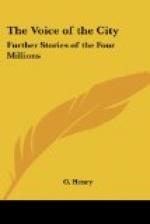Sam Folwell arrived in New York in the night. Still moving and living in the free circles of nature, he did not perceive the formidable, pitiless, restless, fierce angles of the great city waiting in the dark to close about the rotundity of his heart and brain and mould him to the form of its millions of re-shaped victims. A cabby picked him out of the whirl, as Sam himself had often picked a nut from a bed of wind-tossed autumn leaves, and whisked him away to a hotel commensurate to his boots and carpet-sack.
On the next morning the last of the Folwells made his sortie into the city that sheltered the last Harkness. The Colt was thrust beneath his coat and secured by a narrow leather belt; the hunting-knife hung between his shoulder-blades, with the haft an inch below his coat collar. He knew this much—that Cal Harkness drove an express wagon somewhere in that town, and that he, Sam Folwell, had come to kill him. And as he stepped upon the sidewalk the red came into his eye and the feud-hate into his heart.
The clamor of the central avenues drew him thitherward. He had half expected to see Cal coming down the street in his shirt-sleeves, with a jug and a whip in his hand, just as he would have seen him in Frankfort or Laurel City. But an hour went by and Cal did not appear. Perhaps he was waiting in ambush, to shoot him from a door or a window. Sam kept a sharp eye on doors and windows for a while.
About noon the city tired of playing with its mouse and suddenly squeezed him with its straight lines.
Sam Folwell stood where two great, rectangular arteries of the city cross. He looked four ways, and saw the world hurled from its orbit and reduced by spirit level and tape to an edged and cornered plane. All life moved on tracks, in grooves, according to system, within boundaries, by rote. The root of life was the cube root; the measure of existence was square measure. People streamed by in straight rows; the horrible din and crash stupefied him.
Sam leaned against the sharp corner of a stone building. Those faces passed him by thousands, and none of them were turned toward him. A sudden foolish fear that he had died and was a spirit, and that they could not see him, seized him. And then the city smote him with loneliness.
A fat man dropped out of the stream and stood a few feet distant, waiting for his car. Sam crept to his side and shouted above the tumult into his ear:




